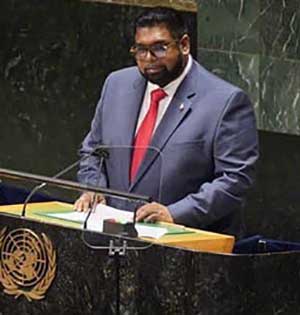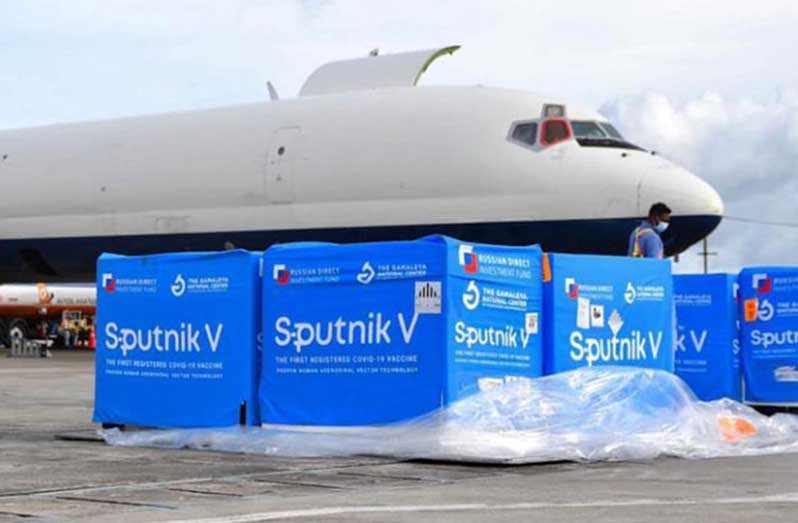–President Ali says efforts being made to secure steady supply of ‘jabs’
A MUCH-anticipated shipment of the second doses of the Russian-made Sputnik V COVID-19 vaccine is expected to arrive in Guyana within seven days, according to President Dr. Irfaan Ali.
The Head of State told a press conference on Friday that much effort has gone into ensuring that Guyana secures the life-saving ‘jabs’, and that a steady supply stream is established and maintained.

“Every night, we are on the phone dealing with this; talking to the Ambassador of Russia, talking to Russia directly, talking to every stakeholder who can assist in this,” President Ali said at a press conference hosted on Friday in New York, where he is attending the 76th United Nations’ General Assembly.
The government’s efforts come even as the world grapples with shortages of the COVID-19 vaccines, and as thousands of Guyanese who have already taken their first injections of the Sputnik V eagerly await their long- overdue second ‘jab’.
Even though the gap between the first and second doses of the Sputnik V vaccine was previously established as four weeks, a new study conducted by the Gamaleya Research Institute, which created the vaccine, has shown that this gap could be extended to as much as 180 days while still remaining effective.
In the circumstances, Minister of Health Dr. Frank Anthony had assured persons that they should have no fear about taking the delayed ‘jabs’. As it is, approximately 80,000 persons are awaiting their second doses of the Sputnik V vaccine, which is currently in use by 70 countries.
In a recent statement, the Sputnik V team confirmed that owing to a major scale-up in vaccine production capacity, they were faced with temporary delivery delays for the second component. It was promised that this situation would have been resolved in August.
“Demand for Sputnik V worldwide remains very high, due to its exceptional efficacy and safety, as well as absence of any serious side effects, which have been linked to the use of some other vaccines,” the team said in a statement.
It was reported, too, that in countries where Sputnik V is used as part of their national vaccination campaigns, notably in Argentina and Mexico, a steady decline in COVID-19 cases was recorded.
Further, a study by the Gamaleya Research Centre published in the “Vaccines International” medical journal, has shown that the Sputnik V vaccine is one of the most efficient vaccines against the coronavirus, including the more deadly Delta variant, which is believed to be the cause of the increase in COVID-19-related deaths here.
Despite the real-world data that supports the 90-percentile efficacy of the Sputnik V vaccine, it has not yet received full approval from the World Health Organisation (WHO). As a result, it is not being recognised by some developed countries, many of which have begun to impose vaccination requirements for entry, using only the WHO-approved ‘jabs’.
In his inaugural address to the United Nations’ General Assembly on Thursday, President Ali warned that taking this route could hurt the global efforts to end the polarisation of access to vaccines.
“The access to vaccines saw the world polarised,” President Ali told his fellow world leaders, adding: “We must not now hurt our efforts at ending this polarisation of access to vaccines by implementing measures that divide us and curtail our movement, based on the type of vaccines our people took.”
As he observed: “Millions took the vaccines which were available at a time of much uncertainty, and they are the unsung heroes. They must not now be the subject of restrictions, based on the vaccines they took.”
President Ali, in his strongly-worded address to the UN, said that instead of differentiating between the vaccines, countries should redirect their efforts towards addressing more pressing issues such as vaccine hesitancy, and promoting full vaccination of all eligible citizens of the world.




.png)









